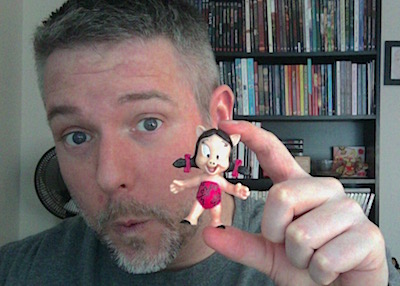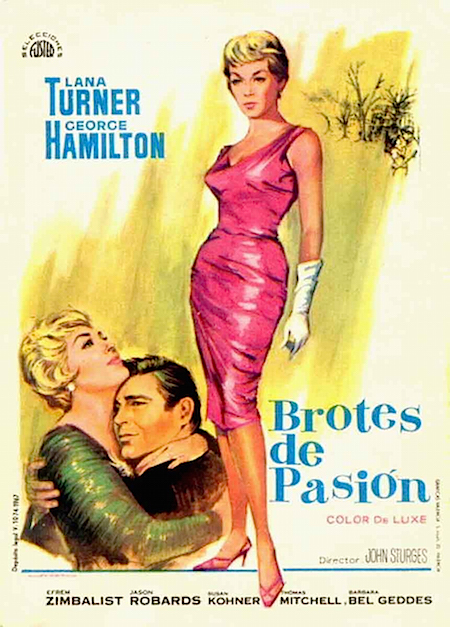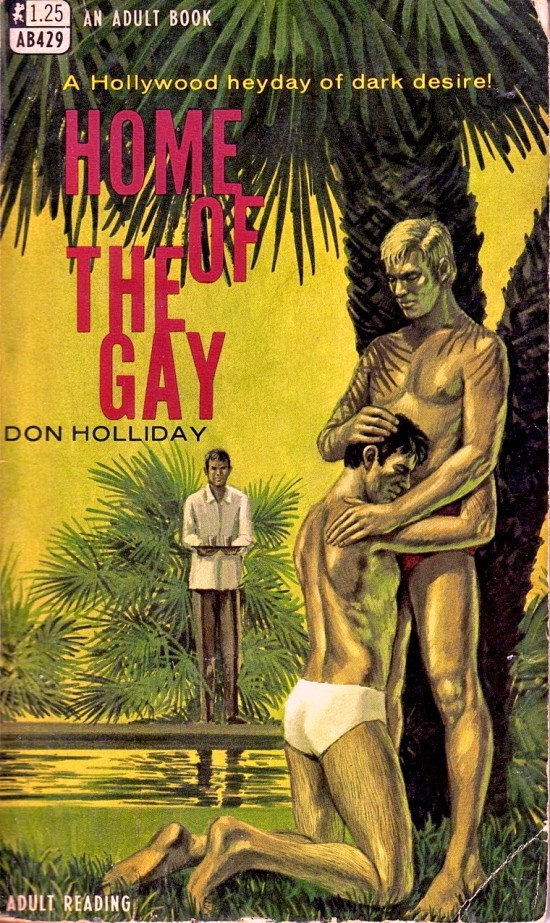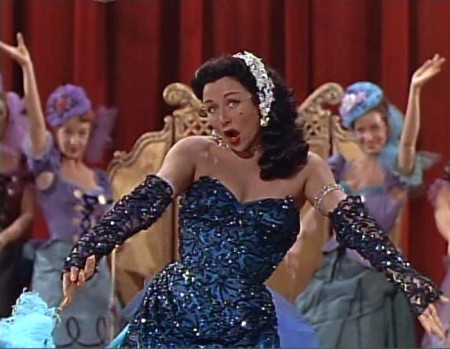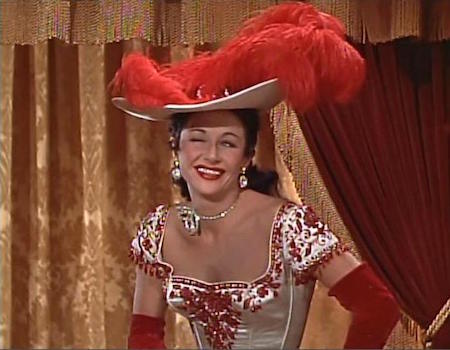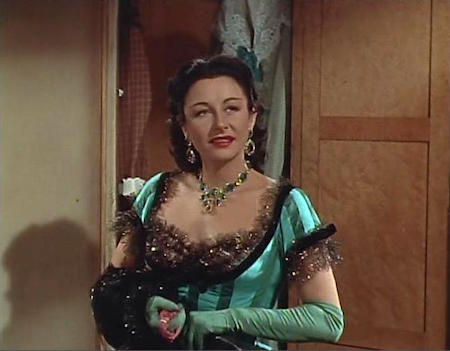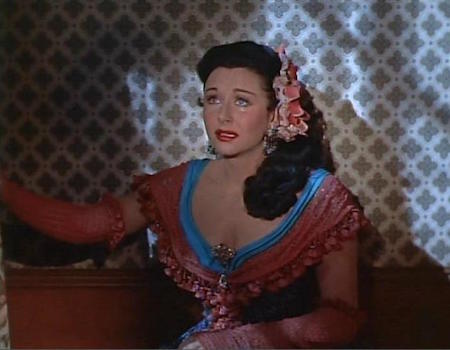#WonderWomanWednesday
Today we have a 2.5 inch premium toy (from McDonald’s I think) of Wonder Pig! Petunia Pig (Porky’s girlfriend) is all decked out as the world’s most heroic amazon. Also featured in the early 90’s collection were Daffy as BatDuck, Bugs as SuperBugs (or SuperRabbit I guess) and a fourth character that I can’t remember.
The costume is hard plastic that clips over the figure. Here she is in her modest bathing attire.
Cool Cinema Trash: By Love Possessed (1961)
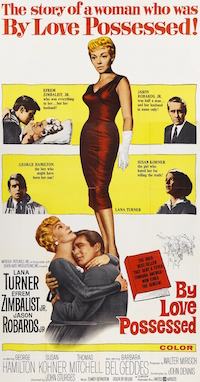 The story of a woman who was By Love Possessed!
The story of a woman who was By Love Possessed!
In one of the most successful films of her career, Lana Turner played a woman facing possible scandal in a small town called Peyton Place (1957). After facing her own real life scandal and trial, she returned to familiar cinematic territory with By Love Possessed (1961), a melodrama based on the James Gould Cozzens best seller about the secret passions bubbling beneath the surface of a picturesque New England community.
What it’s all about: The soapy plot revolves around the interconnected lives of three local lawyers who work at the same firm. Jason Robards helpfully describes how the local townsfolk perceive each of the partners. Thomas Mitchell is “the grand old man,” Efrem Zimbalist Jr. is “the pillar of the community” and Robards labels himself the “Egghead.”
Zimbalist’s son, George Hamilton, is home from Harvard and resentful of the life that lies ahead of him. “Living in your town, working in your law firm, marriage to the girl of your choice.”
That girl is virginal Susan Kohner, who also happens to be “the richest orphan in Winner County.” She knows that Hamilton has had success with girls more worldly than she, “You never even once tried with me.”
“I wouldn’t have succeeded now would I?”
“No… you might have had the decency to try.”
Hamilton also disagrees with his father about a case that they’re preparing for trial. Hamilton argues that it would be in the client’s best interest if he lost the case, but for Zimbalist the law is black and white. He is unable to bend the rules and is seemingly incapable of compassion.
Boozy society wife Lana Turner interrupts a private hearing at her husband’s office. Turner drunkenly stumbles around (an act she’d later perfect in Madame X, 1966) before begging Zimbalist to help her divorce Robards.
He assures Turner that he’ll “give her a divorce any time she asks for it… sober.” He goes on to explain that his wife is, “miserably unhappy, so she gets drunk.” It seems poor Lana has “urges and needs” that he can’t satisfy because an auto accident has left him crippled.
A big city lawyer meets with Zimbalist to inform him that Mitchell has improperly handled twenty thousand dollars of a client’s estate. When Zimbalist visits the hospital to see wife Barbara Bel Geddes (who’s laid up for a week because of a fall on the tennis court) he breaks the news that they’ll have to force Mitchell into early retirement. Since Mitchell is her father, she’s understandably upset. It just one more issue to add to the marital problems between them.
Before Robards leaves for Washington on business, he warns Turner that, “If you keep on the way you’re going, they’re going to label you the lovely lush.”
She reiterates that her problems stem from her “human wants and needs”.
“Well go out and get what you need.” He bellows, “Just don’t let me know!”
In the kind of dramatic monologue she excels at, Turner recounts the tale of the night he came home from his accident. “You pushed me away. You made me feel like an animal, before I knew I was one,” she sighs, wringing every ounce of pathos out of the moment. She asks again for a divorce, but he refuses.
While on the way home from the country club, Turner spots Zimbalist out for an evening stroll. With Elmer Bernstein’s dramatic theme underscoring just how verboten their meeting is, they stand beside a gazebo and ponder their attraction. With an artfully painted backdrop for their scenery and carefully positioned arc lights for their flattering blue moonlight, they share a forbidden kiss. They hop in the car and drive to a nearby stable for a satisfying roll in the hay.
Meanwhile, Hamilton has his eye on trampy diner waitress Yvonne Craig. Even the town doctor pronounces that this petulant gal from the wrong side of town has “Been around more in her twenty years than the moon in it’s millions.” When Hamilton offers her a drink, she vamps the memorable line, “If I get drunk and pass out… it’s no fun for me. If you get drunk and pass out… it’s no fun for me.”
They drive to a wooded area where’s there’s plenty of fun to be had by all. When he gives her the inevitable brush off, she slaps him and reads him the riot act while habitually referring to herself in the third person,”Nobody treats Veronica like a tramp but Veronica!” She smacks him a few more times for good measure.
Bel Geddes arrives home from the hospital in time to learn that Craig has accused her son of rape. Hamilton admits that he had carnal knowledge of the girl, but didn’t force her. Zimbalist doesn’t believe him and lectures Hamilton in a Perry Mason-style rant about love and lust, two things Zimbalist knows quite a lot about.
Good girl Kohner is upset when she hears the news about her fiancé, but is prepared to stand by her man. He knows he doesn’t deserve her support and comes clean with the truth, “I don’t love you. I wish I did, but I don’t.” Hamilton then skips town before his scheduled hearing.
Kohner makes preparations to go away, “Sometimes on a trip, they say you find yourself.” She ends up going on a trip, the eternal kind. She commits suicide (tastefully off camera) by swallowing cleaning fluid.
With all that is going on, Zimbalist and Turner get philosophical about their affair. “We needed something… an escape.”
“An act of defiance.” He agrees.
While wearing a wildly unflattering orange dressing gown, Turner prepares to leave her husband, but is interrupted by Hamilton’s return to town. She tells him of Kohner’s suicide and he naturally feels guilty. Turner helpfully points out, “You didn’t kill her. She killed herself.”
Robards also returns to town and while going over Kohner’s will with Zimbalist, they take a closer look at the ledgers kept by Mitchell. As it turns out, he wasn’t incompetently handling the accounts, but embezzling funds… for a good cause. Zimbalist is willing to keep the whole thing quiet. Robards marvels at the sudden change in his idealistic partner, “Last Tuesday you wanted to tell Noah that he was incompetent, too old, too feeble to run the firm.”
“That was Tuesday, this is Friday.”
“What happened in between?”
“Wednesday and Thursday.”
With his new, slightly more forgiving take on life, Zimbalist tepidly tells his wife how much he cares. When Hamilton walks in the front door, only a few words are needed for the family to be reunited.
With a similarly brief exchange, the bad years between Turner and Robards are forgotten. Since she conveniently forgets to mention the affair with his business partner, their reunion goes quite smoothly. He tosses his cane aside and moves in for a final romantic clinch.
In conclusion: Though Turner receives top billing, By Love Possessed is much more of an ensemble piece than the kind of star vehicle tailored to fit Turner’s specific talents. If anyone might be considered the star of the film, it’d be Zimbalist. Not only does he receive the most screen time, but it’s his character that represents the emotional center the story revolves around. This isn’t to say that Lana enthusiasts will come away disappointed. By Love Possessed may not be as glossy as Portrait in Black (1960) or Love Has Many Faces (1965), but Turner still has several moments in the film that assure her place in the pantheon of classic movie soap queens.
Paperback Cover of the Week: Home of the Gay
Cute Couples
#WonderWomanWednesday
Cool Cinema Trash: Jubilee Trail (1954)
 Sprawling, grand and epic are not the usual adjectives used to describe the product put out by Republic Pictures. Modest, but successful, westerns were the studios bread and butter. More money was spent on the acquisition, production and promotion of Jubilee Trail (1954) than any other Republic film up to that time. The posters even lauded it as, “The greatest American drama since Gone With the Wind”. One look at Jubilee Trail and it’s pretty obvious that this is no Gone With the Wind.
Sprawling, grand and epic are not the usual adjectives used to describe the product put out by Republic Pictures. Modest, but successful, westerns were the studios bread and butter. More money was spent on the acquisition, production and promotion of Jubilee Trail (1954) than any other Republic film up to that time. The posters even lauded it as, “The greatest American drama since Gone With the Wind”. One look at Jubilee Trail and it’s pretty obvious that this is no Gone With the Wind.
What it’s all about: Jubilee Trail opens with Vera Ralston prancing and flirting her way across a stage as the headliner in a New Orleans music box revue. This opening production number puts to rest any question as to who the real star of the film is. Florinda (Ralston) sings a French ditty, though ‘singing’ may be a bit of an overstatement. Ralston is barely able to keep up with the audio track, her mouth never quite matching up with the lyrics of the song she’s supposedly singing.
Moments after the show, Florinda changes from her sequined stage costume into an equally ostentatious gown and comes to the rescue of Garnet Hale (Joan Leslie) who is being harassed by a pair of riverboat gamblers. After a few moments of pleasant chitchat with the newlywed bride, Florinda disappears.
A detective is searching for Florinda. Though Garnett knows nothing about the flashy showgirl’s mysterious past and possible criminal history, she takes Florinda under her wing and hides her upstairs in the honeymoon suite. Garnet’s husband Oliver (John Russell) throws the detective and nosy hotel manager off Florinda’s trail. The Hales even go so far as to disguise the wanted lady and arrange for her safe passage out of town.
The newlyweds continue on to the California territory, stopping in Santa Fe. While Oliver goes to check on the wagon train transporting some of their supplies, Garnet hangs out with Florinda, who has also made her way westward. Florinda has found temporary work as a housekeeper for a fire and brimstone-spouting tradesman, whom everyone laughingly refers to as Deacon.
Late one night, the wagon train pulls into town. Trail boss John Ives (Forrest Tucker) has a special message for Oliver. In a detailed letter from his brother, it is explained that upon Oliver’s arrival in California, he will marry the local girl who has given birth to his child. One wife on the trail and another one waiting for him at home… what’s a poor guy to do?
Everyone gathers at the tavern that evening. Florinda is unable to resist entertaining the local yokels and bursts into song. With her obvious saloon-singing past exposed, the Deacon calls her a strumpet. Them there’s fightin’ words and since this is a western, Jubilee Trail needs at least one old fashioned bar brawl. Punches are thrown, fists begin to fly and stuntmen crash through prop furniture.
The next day it’s back to the trail. After trekking across picturesque desert vistas, they make camp by a watering hole. While pitching her tent, Garnet finds her husband’s letter and reads of the bride and baby awaiting him in California. Suddenly, Indians attack! Everyone, including the women folk, fend off the savages. Garnet is wounded by an arrow, but bravely pulls through, proving that it takes a spirited kind of gal to make it in on the wild frontier.
The wagon train soon arrives at the Hale hacienda. While preparing for the homecoming fiesta, Garnet asks Florinda the purely hypothetical question whether it’s better to know some bad news, or remain blissfully in the dark. “Oh, it’s better to know about it honey, that way you can fight it. And when you think you can’t fight, just feel that wound and remember… if you lived through that, you can live through anything.” At the party, Florinda takes a shine to bombastic Siberian fur trapper Nicolai (Buddy Baer) whom she lovingly nicknames ‘handsome brute’.
When Charles (Ray Middleton) learns of his brother’s marriage to Garnet, he is furious, “Your impertinence comes as easy as your follies. We would have controlled more land than any Americans out here if you’d married Carmelita.”
Oliver must finally tell Garnet. She foregoes the usual hysterics, “I feel sorry for you Oliver… and sorry for the girl and her child.” Garnet may be handling the situation stoically, but others… not so much. Word arrives that Carmelita has ridden off a cliff with her bastard child in her arms. The Velasco men storm the Hale ranch seeking vengeance and kill Oliver.
Now a widow, with a baby of her own on the way, Carnet continues with the wagon train to Los Angeles where she can start a new life, living in a little room above the saloon where Florinda works as bartender. Garnet waits patiently for her child to be born. Though “her time is not far away”, you’d never know it. Apparently, saying a woman was pregnant in 1954 was one thing, but showing said pregnancy was another thing altogether. John Ives tells her that California has officially become a state, “Now, if the baby’s a boy, when he grows up he can be president someday.”
Sourpuss Charles shows up demanding that Garnet return with him to the ranch, “I will not have my brother’s child born in a place like this!”
“You’re not going to have anything to do with this baby, you’re not going to have a chance to ruin his life like you did your brother’s!” The strain of her confrontation with Charles sends Garnet into labor. While Texas (Pat O’Brien), the loveable drunken doctor, delivers the baby upstairs, Florinda helps out the best way she knows how… by leading a saloon sing-a-long. After her number, Nicolai croons the title song, everyone in the bar eventually joining in.
The baby is strong and healthy and everything seems to be going well for our merry band of western misfits, at least until Charles comes riding back into town with a pair of hired guns. One of the ruffians tries to force himself on Garnet, but John Ives comes to her rescue with guns blazing, following the man out back for a moonlight shootout. John is clearly crazy about Garnet, but he’s never one to settle for too long and decides to hit the trail again. He leaves her with a single heart-felt kiss goodbye.
After a drunken fall, Texas lays on his deathbed. Garnet watches over her friend with her baby by her side. When Charles bursts in threatening to take the baby away forever, Texas shoots him dead, the last redeeming act of a dying man.
After all the excitement, Garnet and Florinda have a heart-to-heart. Florinda suggests that she go back east where it’s safer and she can marry a rich man. Garnet couldn’t possibly leave. She’s too in love with John Ives. Florinda admits that she too once loved a man, telling the tale of a husband who started a blaze in a fit of jealous rage, “The whole place was burning. As we fought, he fell into the flames. They say I killed him, but I didn’t. He died in the fire he started himself.”
With the villainous Charles taken care of, it’s time for the ladies of Jubilee Trail to decide their futures. Florinda is so distraught to learn of Nicolai’s return voyage home, that she prays for guidance. “Dear God, this is my first prayer, so don’t expect too much. I don’t know whether I want the handsome brute to come back here or not. So, I guess I’ll leave it up to you. But let him be happy, the way he is now, as long as he lives.” To be extra sure that her message doesn’t get lost in God’s in-box, she signs off, “…Florinda.”
Just then, John returns with news of a nearby gold strike. Florinda quickly forgets about Nicolai and plots her next venture, “Let them splash around in streams and break up rocks. When they’re cold and hungry and tired, then they can bring their gold into a little place I’ll have up there. I’ll carry the best food in town. There’ll be music and fun and I’ll get gold without digging for it!”
John finally professes his true feelings, “Every turn of the trail I came to, I hoped you’d be around the next bend.” He wants Garnet and the baby to join him in the adventure of the California gold rush.
“I don’t want to settle down and be safe any more than you do,” she tells him as they join Nicolai and Florinda in a toast to the bright future that lies ahead. In the closing shot of the movie, a heavenly chorus sings the praises of the Jubilee Trial as a wagon train heads onward into history.
In conclusion: By all accounts, Jubilee Trail is an average western (though it’s more soap opera than horse opera). The film would have faded into obscurity if it were not for one thing. It’s leading lady. Vera Ralston has developed a cult following as one of the worst actresses of all time. While calling her the absolute worst is a bit harsh, there is a certain mediocrity in her acting that is sure to appeal to any bad movie fan.
Born in Czechoslovakia, Ralston was a figure skater before she came to the U.S. in hopes of becoming the next Sonja Henie. She signed with Republic Pictures in 1943 and became the protégé of Herbert J. Yates. The studio head would later leave his wife to marry Ralston, spending the rest of his tenure at the studio trying to turn his young wife (Yates was 40 years her senior) into a star. Though she reportedly worked hard at her craft, Ralston never managed to be anything more than competent in the roles she played. No expense was spared in the making of Jubilee Trial, a film created entirely as a showcase for Ralston. The film did fine, though it certainly wasn’t the sensation that Yates was hoping for. He continued to give Ralston lead roles in films alongside such luminaries as Erich von Stroheim, Jimmy Stewart, Fred MacMurray and John Wayne. But audiences never took to her. With her heavy accent and limited acting range, Ralston never quite reached the heights Yates envisioned.
Ralston retired the same year that Yates left Republic.
Jubilee Trail is not yet available on DVD. It is currently available (as of 2015) on Amazon’s Instant Video streaming service.


